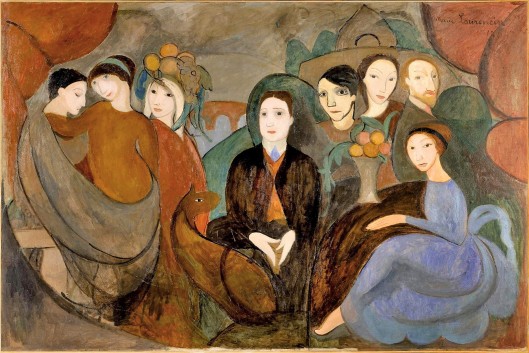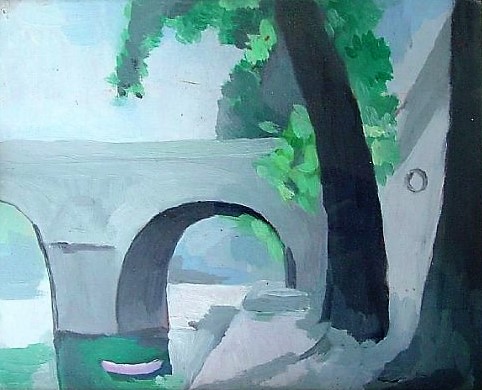Tags
a Song, Alcools, Calligrammes, Guillaume Apollinaire, le Tout-Paris, Marie Laurencin, Sous le pont Mirabeau, Visual Poetry

Marie Laurencin, 1909, Réunion à la campagne (Apollinaire et ses amis), oil on canvas, 130 x 194 cm, Musée Picasso, Paris. Reproduced in The Cubist Painters, Aesthetic Meditations (1913)
Sous le pont Mirabeau
de Guillaume Apollinaire (1912)
- Sous le pont Mirabeau coule la Seine (1)
Et nos amours
Faut-il qu’il m’en souvienne
La joie venait toujours après la peine
Under Mirabeau bridge flows the Seine and our love. Need I remember ? Joy always came after the pain.
Vienne la nuit sonne l’heure
Les jours s’en vont je demeure
Let night come and the hour ring. Days go away, I remain.
- Les mains dans les mains restons face à face (2)
Tandis que sous
Le pont de nos bras passe
Des éternels regards l’onde si lasse
Hand in hand, let us stay face to face. While, beneath (sous) the bridge of our arms, Tired of being stared at eternally, flow waves, so weary.
Vienne la nuit sonne l’heure
Les jours s’en vont je demeure
Let night come and the hour ring. Days go away, I remain.
- L’amour s’en va comme cette eau courante (3)
L’amour s’en va
Comme la vie est lente
Et comme l’Espérance est violente
Love goes away as this water runs. Love goes away. How slow life is, and Hope, so pressing (violent).
Vienne la nuit sonne l’heure
Les jours s’en vont je demeure
Let night come and the hour ring. Days go away, I remain.
- Passent les jours et passent les semaines (4)
Ni temps passé
Ni les amours reviennent
Sous le pont Mirabeau coule la Seine
Days pass and weeks pass. Neither the past Nor love returns Under Mirabeau bridge flows the Seine.
Vienne la nuit sonne l’heure
Les jours s’en vont je demeure
Let night come and the hour ring. Days go away, I remain.
My translation is mostly literal. The following is more poetical:
Under Mirabeau Bridge the river slips away And lovers Must I be reminded Joy came always after pain The night is a clock chiming The days go by not I We’re face to face and hand in hand While under the bridges Of embrace expire Eternal tired tidal eyes The night is a clock chiming The days go by not I Love elapses like the river Love goes by Poor life is indolent And expectation always violent The night is a clock chiming The days go by not I The days and equally the weeks elapse The past remains the past Love remains lost Under Mirabeau Bridge the river slips away The night is a clock chiming The days go by not I…
https://muse.jhu.edu/chapter/36210
Comments
Guillaume Apollinaire (Wilhelm Albert Włodzimierz Apolinary Kostrowicki), 26 August 1880 – 9 November 1918, is a French writer, born in Rome. He is of Polish descent on his mother’s side. His father is unknown, but he may have been Francesco Costantino Camillo Flugi d’Aspermont (born 1835). Apollinaire learned French as a child, in Rome. His grandfather served in the Russian army and was killed during the Crimean War.
There is an eternal aspect to Apollinaire’s poetry. He writes as did Villon, Ronsard, Du Bellay… But he is associated with Cubism, Surrealism and Orphism. He may have coined all three terms. (See Guillaume Apollinaire, Wikipedia.) Moreover, the apparent simplicity of his poems foreshadows Jacques Prévert‘s Paroles, 1946) Apollinaire’s Calligrammes could be viewed as his contribution to modernisme. Baudelaire would have called it « du nouveau » (something new, Le Voyage, final line). It mixes words and pictures. It is visual poetry. (See La Tour Eiffel, Apollinaire, Calligrammes, Paris à Nu, Gérard, WordPress.com.) It is also a hint of literary nonsense.
Apollinaire knew everyone, le Tout-Paris, including Gertrude Stein, a patron of the arts. She is pictured to his right in the painting featured at the top of this post. (See The Cubist Painters, Aesthetic Meditations, Wikipedia.) Apollinaire wrote poetry, plays, short stories, and he was an art critic. His poem, in the shape of a cat, is a collection of French expressions referring to cats, such as « La nuit tous les chats sont gris. » (At night, all cats are grey.) « Avoir d’autres chats à fouetter [to whip] » means: to have other fish to fry.
Apollinaire was in love with artist Marie Laurencin (« Marie » and, I believe, his amour in « Le pont Mirabeau »). He sustained a brain injury during World War I, and died, two year later, in 1918, of the Spanish Flu, a pandemic.
RELATED ARTICLES
- Johann Amos Comenius: Word and Art (7 November 2015)
- Marie, the Words to a Love Song (29 June 2015)
- Comenius: Orbis Sensualium Pictus (13 November 2011)
- La Tour Eiffel, Apollinaire, Calligrammes (Paris à Nu, Gérard, le 20 avril 2018) ♥
Sources and Resources
- Alcools (pdf)
- Calligrammes is Project Gutenberg [EBook #55569]
- Britannica.com

Marie Laurencin, Le Pont, 1940 (Artnet)
Marc Lavoine chante Sous le pont Mirabeau

Marie Laurencin (Modern Art Consulting)
© Micheline Walker
30 April 2018
Revised 1st May 2018
WordPress





